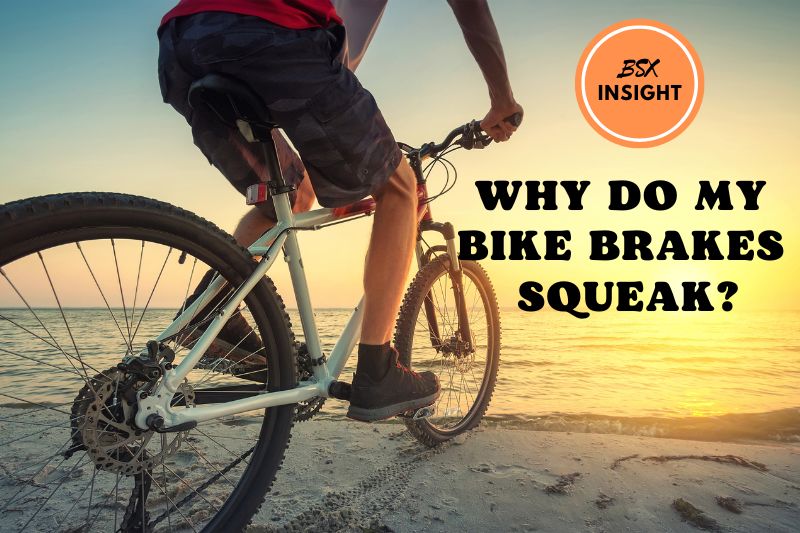Riding a bicycle is not only a great way to stay active and healthy, but it can also be a fun and convenient means of transportation.
However, nothing can be more frustrating than hearing your bike brakes squeak every time you slow down or come to a stop. Not only is it an annoying sound, but it can also indicate a problem with your bike’s braking system.
In this article, BSXInsight will explore the common reasons why do my bike brakes squeak and what you can do to fix the issue.
So, if you’re tired of the constant screeching and want to get back to a smooth, silent ride, keep reading.
Rim Brakes vs. Disc Brakes: What’s The Difference?
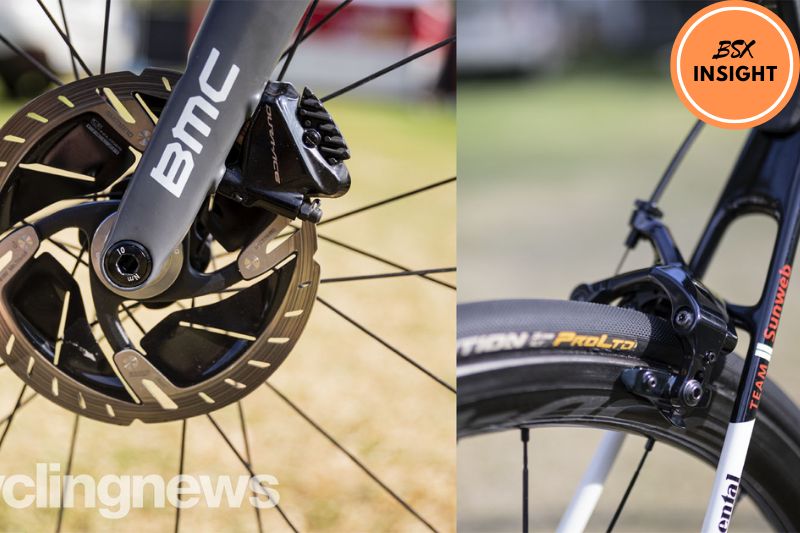
Before we dive into why bike brakes squeak, it’s important to understand the difference between rim brakes and disc brakes.
Rim brakes are the traditional type of brakes that have been used on bicycles for decades.
They consist of two brake pads that squeeze the rim of the wheel to slow the bike down. Rim brakes are lightweight, easy to maintain, and typically less expensive than disc brakes. They are also compatible with most types of bike frames and wheels.
On the other hand, disc brakes are a newer technology that has become increasingly popular in recent years.
Disc brakes use a metal rotor attached to the wheel hub, which is gripped by calipers to slow the bike down.
Disc brakes offer better stopping power and are more consistent in wet or muddy conditions than rim brakes.
They also produce less wear on the rims and are easier to modulate, so you can apply the right braking force for better control.
While both types of brakes can experience squeaking, the causes and fixes may differ between rim and disc brakes.
Why Do My Bike Brakes Squeak?
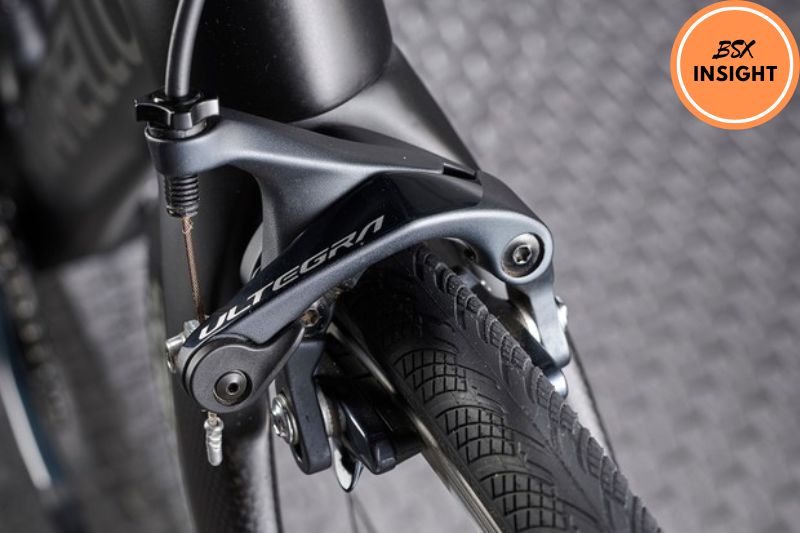
As a bike rider, it can be incredibly frustrating when your bike brakes start to squeak. It is annoying and can also be a safety hazard if the issue is not addressed promptly.
There are a variety of reasons why bike brakes may squeak, and the fixes may differ between rim brakes and disc brakes.
Rim Brakes
Rim brakes, also known as caliper brakes, are a type of braking system that uses brake pads to apply pressure to the rim of the wheel to slow down or stop the bike.
Rim brakes are a common type of brake system found on road bikes, hybrid bikes, and some mountain bikes. When it comes to squeaky rim brakes, there are a few common causes to consider:
Dirt Contamination
One of the most common causes of squeaky rim brakes is dirt contamination. Dirt and debris can accumulate on the rim of the wheel and on the brake pads, causing a squeaking noise when the brakes are applied.
To fix this problem, try cleaning the rim and brake pads with rubbing alcohol or a degreaser. You can also use a toothbrush to scrub away any stubborn dirt or debris.
Grease/Oil Contamination
Another cause of squeaky rim brakes is grease or oil contamination. This can occur if the bike is lubed or serviced and the oil or grease comes into contact with the brake pads.
To fix it, clean the rim and brake pads thoroughly with rubbing alcohol or a degreaser. You may also need to replace the brake pads if they are heavily contaminated with oil or grease.
Brake Blocks Not Toed
Another cause of squeaky rim brakes is improperly toed brake blocks. Toe-in refers to the angle at which the brake pads are set relative to the rim of the wheel.
If the brake blocks are not toed properly, they can cause a squeaking noise when the brakes are applied.
To fix this issue, adjust the angle of the brake blocks so that they are toed in towards the rim. You can use a piece of cardboard or a business card to help with the alignment.
Tried the Above, and Still Squeaking – Consider Replacing
If you’ve tried cleaning your rims and brake pads, toed your brake blocks properly, and still experience squeaky rim brakes, it may be time to consider replacing your brake pads.
Over time, brake pads can wear down and lose their ability to grip the rim of the wheel effectively, causing squeaking or other braking issues.
Disc Brakes
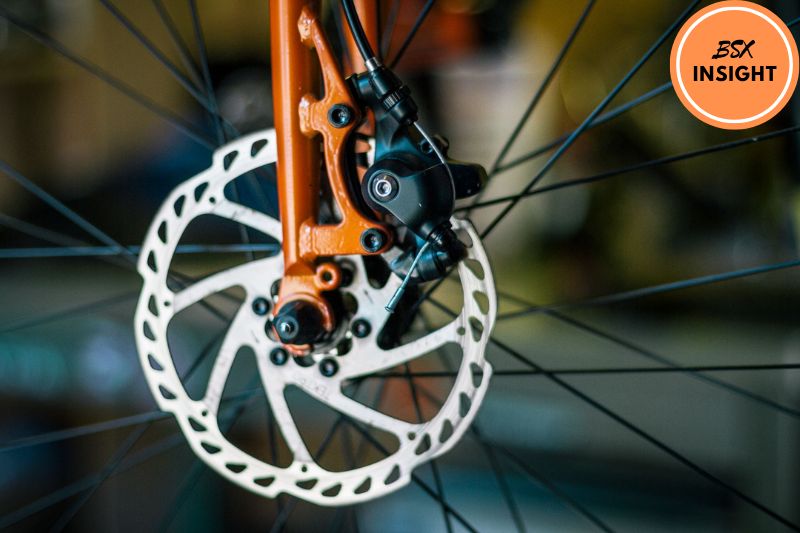
Disc brakes are a newer type of braking system that uses a rotor and caliper to apply pressure to the wheel to slow down or stop the bike.
Disc brakes are commonly found on mountain bikes but are becoming more popular on the road and hybrid bikes. When it comes to squeaky disc brakes, there are a few common causes to consider:
New Bike/Brakes – Bed In
If you’ve just purchased a new bike or replaced the disc brakes on your existing bike, it’s important to properly bed in the brakes.
Bedding in the brakes involves applying gradual pressure to the brake pads and rotors, which helps them to wear in and form a better bond.
You may experience some slight squeaking or rubbing during the bedding process, but this should go away after a few rides.
Make sure to follow the manufacturer’s instructions for bedding in your specific brand of disc brakes.
Dirt Contamination
Like rim brakes, disc brakes can also experience squeaking due to dirt and debris contamination.
If your disc brakes are squeaking, try cleaning the rotors and brake pads with rubbing alcohol or a degreaser.
Make sure to avoid using any cleaning products that contain oil or grease, as this can worsen the squeaking.
Grease/Oil Contamination
Another cause of squeaky disc brakes is grease or oil contamination. This can occur if the bike is lubed or serviced and the oil or grease comes into contact with the brake pads or rotors.
To fix this issue, clean the rotors and brake pads thoroughly with rubbing alcohol or a degreaser. You may also need to replace the brake pads or rotors if they are heavily contaminated with oil or grease.
Glazed Rotors
If your disc brakes are squeaking or making a high-pitched noise, it may be due to glazed rotors.
This occurs when the brake pads become overheated and leave a material layer on the rotor’s surface.
You will need to replace the rotors and brake pads to fix it. It’s important to address this issue promptly, as glazed rotors can cause decreased braking performance and even brake failure in extreme cases.
Caliper Not Aligned
Another cause of squeaky disc brakes is a misaligned caliper. The caliper is part of the braking system that applies pressure to the brake pads to slow down or stop the bike.
If the caliper is misaligned, it can cause the brake pads to rub against the rotor unevenly, resulting in a squeaking noise.
Adjust the position of the caliper so that it is centered over the rotor. You may need to use a brake alignment tool to ensure proper alignment.
Tips To Prevent brake squeal
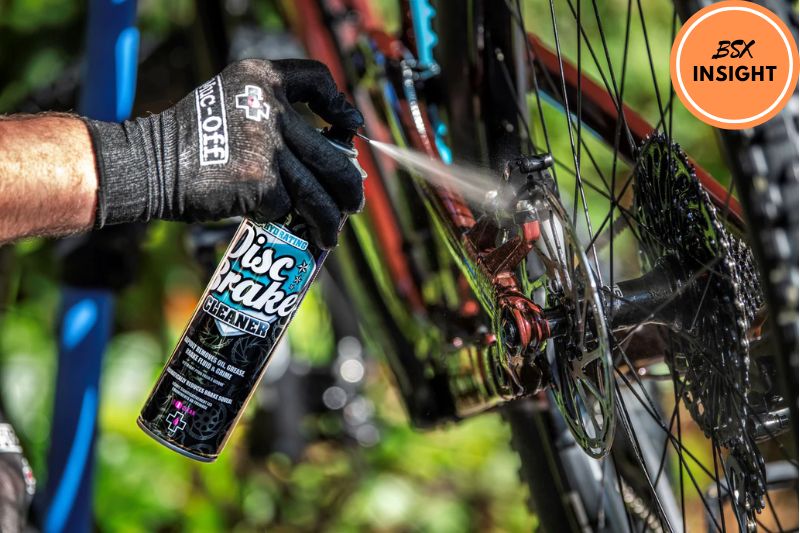
Squeaking brakes can be a nuisance for cyclists, and it can also indicate a safety hazard. If left unchecked, squeaking brakes can lead to decreased braking performance, which can put you and other road users in danger.
The good news is that there are several steps you can take to prevent brake squeals and maintain your bike’s braking system.
Preventive Degreasing
One of the most effective ways to prevent brake squeal is to perform preventive degreasing on your bike’s braking system.
Grease or oil contamination can cause your brakes to squeak, so it’s important to keep your braking components clean and free of any oil or grease buildup.
You can use a degreaser or rubbing alcohol to clean your braking system, including the rotors, pads, and calipers.
Bedding Brakes
Another effective method to prevent brake squeal is to bed your brakes properly. This process involves breaking in new brake pads by applying them repeatedly to the rotor at different speeds and pressures.
By bedding your brakes properly, you can reduce the risk of glazing or contamination and ensure smooth and consistent braking performance.
To bed your brakes, find an empty road or parking lot and start with a few moderate stops to warm up the brake pads.
Then, accelerate to a moderate speed and apply the brakes firmly, but not excessively, until you come to a stop.
Repeat this process several times, gradually increasing your speed and pressure until you feel confident in your braking performance.
Bleeding Hydraulic Brakes
If you have hydraulic brakes, bleeding your brake system regularly can also help prevent brake squeals.
Hydraulic brakes use fluid to transfer pressure from the brake lever to the caliper, so any air bubbles or contamination in the system can cause your brakes to squeak.
Bleeding your brake system involves removing any air or contaminants from the hydraulic fluid, which can help maintain consistent braking performance and reduce the risk of squeaky brakes.
To bleed your hydraulic brakes, consult your bike’s manual or take your bike to a professional bike mechanic.
They will have the tools and expertise necessary to remove any air bubbles or contamination from your brake system and ensure your brakes function properly.
FAQs
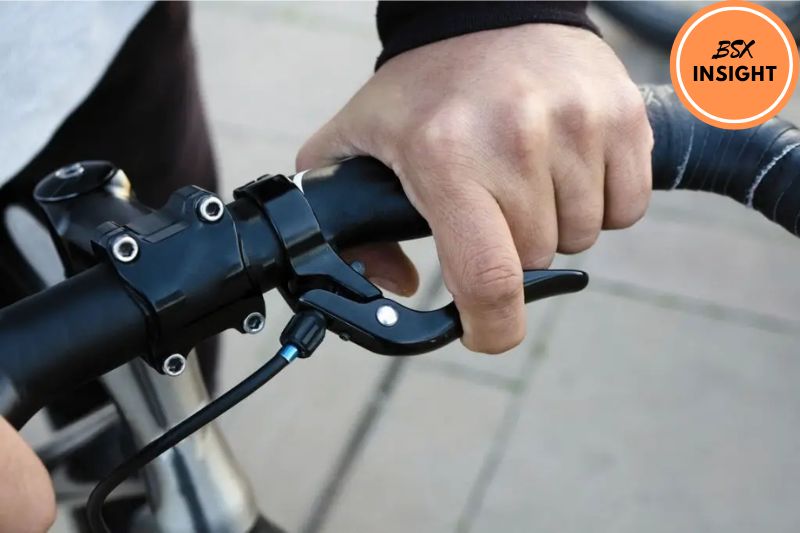
Why do my bike brakes squeak?
There are several reasons why your bike brakes may squeak. It could be due to dirt or grease contamination, glazing of the rotors, misaligned calipers, or improper toeing of the brake blocks.
Can squeaky bike brakes be dangerous?
Yes, squeaky bike brakes can be dangerous because they may indicate decreased braking performance. This can put you and other road users in danger, especially if you’re riding at high speeds or in heavy traffic.
Can I fix squeaky bike brakes myself?
It depends on the cause of the squeak. If it’s due to dirt or grease contamination, you can clean your braking system and try toeing your brake blocks properly.
If the problem persists, you may need to replace your brake pads or take your bike to a professional bike mechanic.
How often should I bleed my hydraulic brakes?
It depends on the manufacturer’s recommendations and how often you use your bike. Generally, it’s recommended to bleed your hydraulic brakes every 6-12 months or if you notice decreased braking performance.
Can brake squeal be a sign of a more serious problem?
Yes, brake squeal can sometimes indicate a more serious problem, such as worn or damaged brake pads, contaminated brake fluid, or misaligned calipers.
If you’re unsure about the cause of the squeak or if it persists after cleaning and maintenance, it’s best to take your bike to a professional bike mechanic for diagnosis and repair.
Conclusion
In conclusion, bike brakes can squeak for various reasons, including worn brake pads, dirty or contaminated brake pads, misaligned brake pads, and worn or contaminated brake rotors.
It is important to address brake squeaking promptly, as it can be a sign of a more serious issue or can cause damage to your bike.
Regularly inspecting and maintaining your brakes can help prevent squeaking and ensure that your bike is safe and enjoyable to ride.
If you are unsure how to maintain and repair your bike brakes properly, consider consulting a professional bike mechanic.

